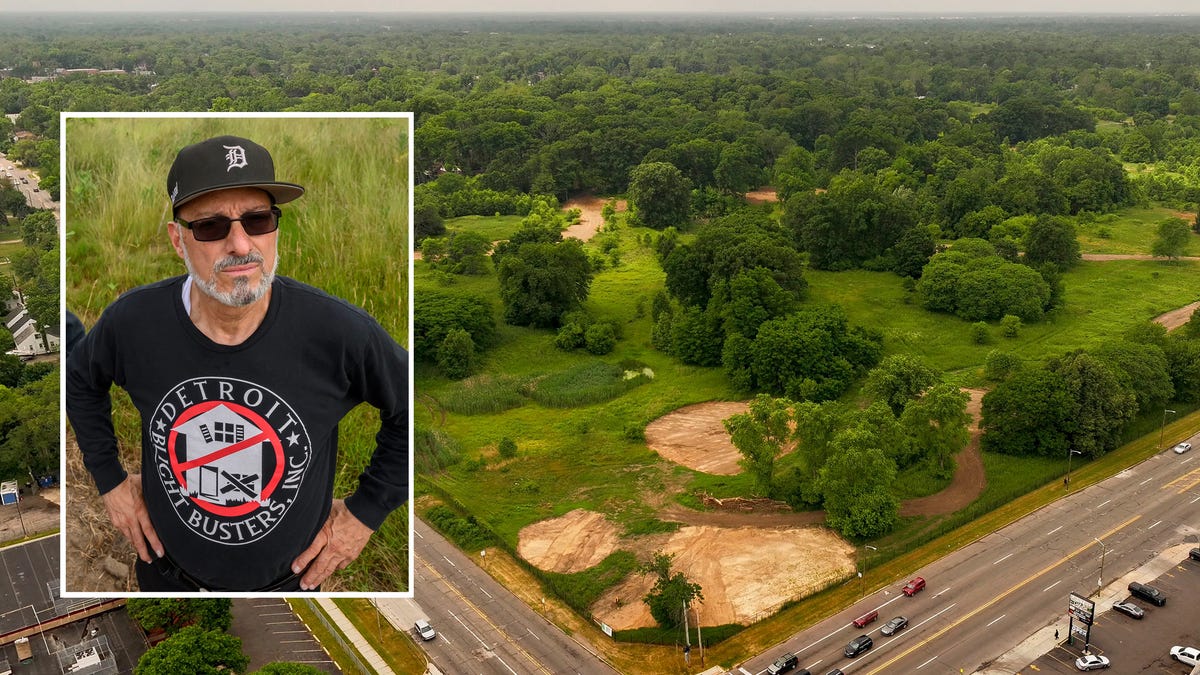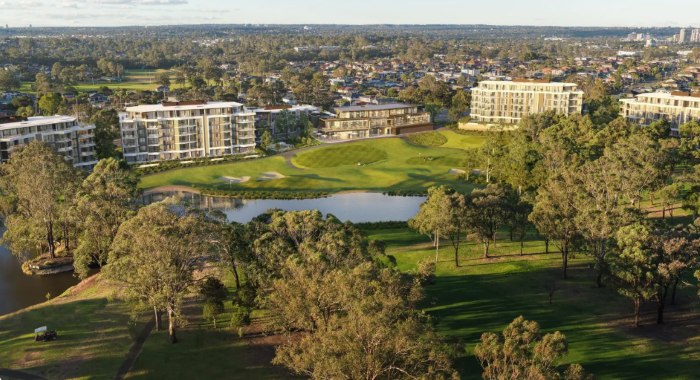Detroit — Eric Robinson remembers the Rogell Golf Course as a peaceful place of recreation when he was growing up in his northwest Detroit neighborhood.
Robinson, a 33-year-old lifelong resident who co-owns a nearby coffee shop, said his grandfather would often visit the golf course, and its closure in 2013 left a void.
“It went from something that was being used, nice, beautiful, to just left for dead, basically abandoned,” he said. “Just me as a resident, I didn’t like it. I’ve seen it at its highest peak, and seeing it at its lowest, it didn’t make sense to me.”
Since the course ceased operation, the 120-acre site at the southeast corner of Berg Road and Seven Mile has sat abandoned, its future uncertain.
Change is coming, though. The city of Detroit, in partnership with the Detroit Economic Growth Corporation, is turning its attention to the property this year with plans for development on 22 acres, as well as construction underway on a passive nature park on the remaining 98 acres.
“I’m actually kind of glad that they’re trying to revitalize … even the nature walk and put businesses there as well,” Robinson said. “I’m kind of super excited, just being a resident.”
This year, the DEGC issued a request for proposals due June 23 for redeveloping the 22-acre northern section of the site along Seven Mile. The city, which expects to choose a developer in August if it receives a viable proposal, is seeking projects that align with its broader revitalization goals, with possible uses including health care, retail, educational, institutional or mixed-use development.
At the same time, the passive nature park on the rest of the property is set to open in October.
City officials say construction crews began environmental remediation for the park in late March following years of community meetings and design planning. The $3.4 million project will feature two boardwalks, nature trails, wetland and meadows. These features are based on the response from residents who wanted a natural, quiet retreat in their neighborhood, said Crystal Perkins, director of Detroit’s General Services Department.
“Although it used to be a golf course — it used to be a very active and popular golf course in (its) heyday, it now is getting a second life as a nature park,” she said. “And we all know the benefits of being outside, being in parks and being in green spaces are very beneficial, not just for your physical health, but also your mental health. And the well-being of a healthy, holistic city.”
‘Cast the widest net possible’
The Rogell Golf Course opened in 1914 and was operated by the city from 1946 to 2007, when it sold the property to Greater Grace Temple for $2.1 million. The church, whose campus sits just west of the former golf course, operated it for five years before shuttering it because it was no longer profitable. In 2018, the city bought the land back from the church for $1.9 million with funds from a 2015 federal grant.
“It went downhill,” said resident Kennith Troupe, 74, who has lived in the area for nearly 20 years.
Troupe said he used to hit golf balls on the range and walk with his friends as they played the nine-hole course.
“It was well-maintained,” he said. “A lot of people would come and golf in the park.”
David Howell, vice president of real estate and development services for the DEGC, said the 22-acre development site is unique in the city’s real estate inventory due to its location next to the large planned natural park.
“It’s one of the larger sites that have been RFP’d recently,” he said. “The goal was to cast the widest net possible. There are RFPs issued by the city that call specifically for mixed-use housing on a given site, but given the uniqueness of the site and the fact that it’s 22 acres, we were intentional about being general so we could cast, again, the broadest possible net.”
Howell said the request for proposals also stands out because it was shaped by extensive community engagement. He said residents and local organizations were consulted during a 2018 framework plan process and played a key role in discussions about what kind of development should and should not happen on the site.
Among the uses that residents didn’t want: warehouses, mechanic shops, churches, funeral homes, massage parlors or alcohol and drug rehabilitation clinics.
“You have four or five very active community organizations, and those residents really care about what goes on on the 120 acres,” Howell said. “The location itself is in an area where you’ve got tradition and a history of folks that are active and really care about what goes on the site.”
Troupe, who is president of the Berg-Lahser Community Association, said he supports the city’s efforts to convert the majority of the space into a nature park. He said while he’s optimistic about the park plans, residents have voiced concerns about security.
“What they don’t want is gangs, teenagers, gangs of people congregating in the park, sitting there drinking, smoking, and this is that,” he said. “So that’s one of the major (concerns) that we have.”
As for the development along Seven Mile, Troupe said he’d like to see health-oriented retail, including a health food store, vegetable market, florist or a small clinic.
The neighborhood doesn’t need any more liquor stores, fast-food restaurants, gas stations or beauty supply stores, he said.
“There’s too many of them,” he said.
Seeking the right mix
John George, founder and executive director of Detroit Blight Busters, said his nonprofit organization planned to submit a proposal to redevelop the site along Seven Mile. He sees a mix of retail, affordable senior housing, and possibly single-family housing in its future.
“Most of our work over the years has had to do with destroying and cleaning up, and now it’s more building up and providing affordable housing and really beautiful facilities for people to live — that’s affordable,” he said. “We are supporting the effort to develop that site. I used to golf there as a child and as a young man, and we kind of miss the golf course.”
George said he estimates the work will take about $90 million to complete. It’s a heavier financial lift than The Orchard Village Apartments, a $16 million, 48-unit affordable housing project by Detroit Blight Busters and CHN Housing Partners, which they celebrated with a ribbon cutting earlier this month.
There will be some environmental challenges, George said, noting the presence of pesticides and other chemicals used to treat golf courses. As the recently elected chair of the city’s Brownfield Redevelopment Authority, he said: “Brownfield is going to be brought into the equation, but if necessary, I would take that to our colleagues at the table and ask for their support. If there are tax credits available for a project, we would really like to develop as much of that corner as possible.”
Jeff Horner, a lecturer in urban studies at Wayne State University, said the plan appears to align with the city’s development priorities.
“It checks a lot of boxes,” Horner said, noting the balance between development and nature preservation.
He said the dual-use strategy is forward-thinking, especially when the city could have just sold all the land to the highest bidder. He said residents will value living near a nature park.
“I think it really said a lot about the current administration wanting to promote park space in the city, because the stuff is important,” he said. “It’s great for property values. You probably benefit your tax base better by keeping more and more park space than you do by selling off that park space for more tax base. It’s a little bit counterintuitive, but it’s true.“
Perkins said the city will maintain the park as it does its other 300-plus city parks. The park will be connected via a new crosswalk with Lahser-Clarita Park, which is to the east off Lahser Road south of Seven Mile. The addition of the crosswalk as well as the park’s boardwalk will provide a safer route for schoolchildren who walk to the Charles Wright Academy of Arts and Science as opposed to taking Berg Road, she said.
When asked if there will be programming or activities in the park, Perkins said the city is “exploring the ways we can use the nature park to engage and teach the community about the nature in their own backyard.”
Marilyn Southern, an 80-year-old resident who has lived in the neighborhood for more than 50 years, said she would like the park to be well-maintained. She also believes it should offer regular programming and suggests the city partner with other organizations to make that happen.
“They can get creative …” she said. “You have to have a vision for that — and a commitment.”
cwilliams@detroitnews.com







